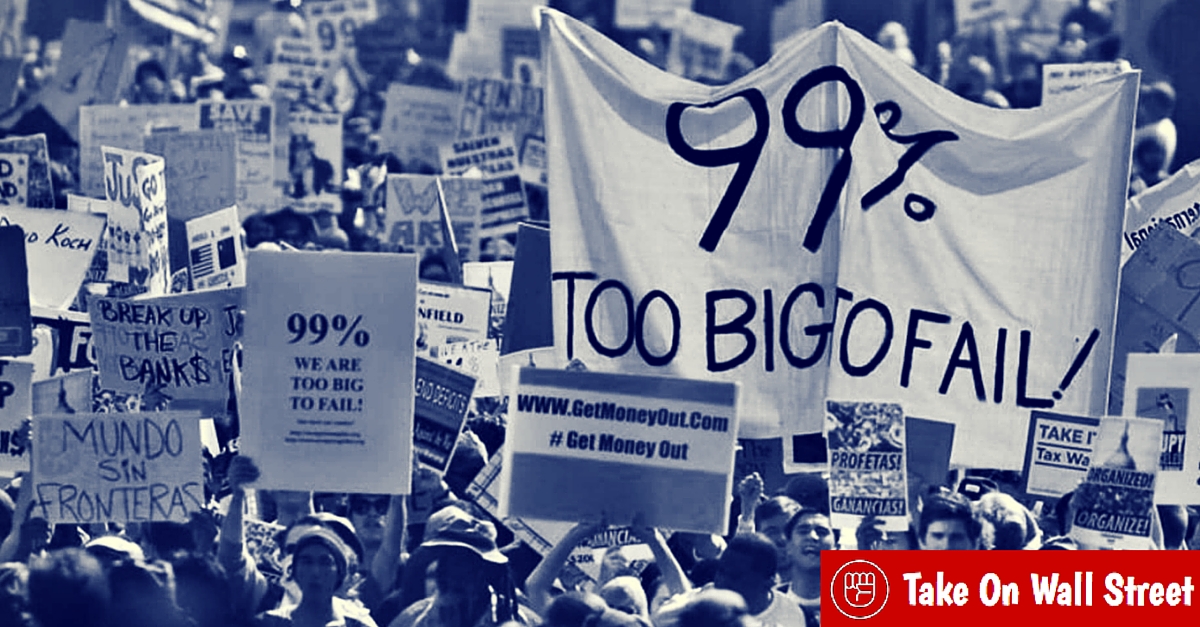

Share
Saying it’s time once again to make Wall Street work for Main Street, and not the other way around, top unions and their allies launched a campaign, “Take on Wall Street,” to rein in abuses by the financial sector.
At a crowded May 24 press conference, AFL-CIO President Richard Trumka praised the Dodd-Frank law, which labor helped push through five years ago after the 2008 Great Recession, but said it does not go far enough.
Other speakers, led by Sen. Elizabeth Warren, D-Mass., the banks’ biggest foe, agreed.
“Dodd-Frank has reined in Wall Street’s most reckless practices, but it was designed to deal only with the most acute, urgent problems,” Trumka said in his speech. “It’s time to go on the offensive.”
That means a comprehensive program to rein in the financiers. It features:
• Restoring the barrier between commercial banking – Mom and Pop’s savings’ accounts –and Wall Street investment banking and trading, which the GOP-run Congress and Democratic President Bill Clinton demolished in 1999. That Great Depression-era Glass-Steagall Act worked and prevented U.S. bank failures for 50 years, Warren said. She’s introduced legislation to restore Glass-Steagall.
• Imposing a small transactions tax, which the U.S. had until the mid-1960s on financial transactions, but limiting it to speculative mass and computer-generated trading. That trading accounts for 70 percent of all swaps in the financial markets – and for the billion-dollar payouts to hedge fund managers who don’t produce anything, speakers said. The financial transactions tax would not only raise billions of dollars yearly – estimates ranged from $100 billion to $300 billion – but would also curb the speculators, speakers added.
• Creating a mechanism to break up the big banks. Warren cited a statement from their regulator, the Federal Reserve, two weeks ago, saying that “too big to fail” still is a threat. The Fed, she said, calculated that if any one of the nation’s seven largest financial institutions failed, it would take the entire economy down with it. That’s what happened in 2008.
• Closing two loopholes financiers use to evade taxes, which in turn loads taxes on everyone else. The “carried interest’ loophole lets hedge fund managers pay taxes on their income at the lower federal capital gains rate, rather than at ordinary tax rates. As a result, the top 25 hedge fund managers in the U.S. “earned more than all kindergarten teachers combined,” said Lisa Donner, the new executive director of the labor-backed Americans for Financial Reform. The other loophole lets companies deduct excessive executive compensation.
• Expanding banking services to the unbanked quarter of the U.S. population who have neither savings nor checking accounts. They now must turn to payday lenders who charge interest rates of 300 percent or more annually, or to similar enterprises. The elderly, minorities, retired workers and others are particular victims of such sharks, speakers said.
Specifically, the coalition would put the U.S. Postal Service back in the banking business, able to offer checking and savings accounts at all of its branches nationwide.
Major unions also lined up to support “Take On Wall Street,” with its list of sponsors including the AFL-CIO, AFSCME, the Teachers, the Postal Workers, the Government Employees, the Communications Workers, the Economic Policy Institute, the Auto Workers, the National Education Association, the Service Employees, Unite Here and Working America.

